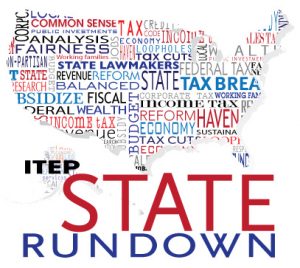 This week, transportation funding debates finally concluded with gas tax updates in Indiana, Montana, and Tennessee, and appear to be nearing an end in South Carolina. Meanwhile, Louisiana and Oregon lawmakers debated new Gross Receipts Taxes, and Texas legislators considered eliminating the state’s franchise tax.
This week, transportation funding debates finally concluded with gas tax updates in Indiana, Montana, and Tennessee, and appear to be nearing an end in South Carolina. Meanwhile, Louisiana and Oregon lawmakers debated new Gross Receipts Taxes, and Texas legislators considered eliminating the state’s franchise tax.
— Meg Wiehe, ITEP Deputy Director, @megwiehe
- Louisiana Gov. Bel Edward’s Commercial Activities Tax (CAT) was pulled from committee early this week without a vote due to opposition, and it won’t be making any comebacks this legislative session. What comes next? The most concrete idea from the House right now appears to be a “standstill budget,” which would close half of the $1.3 billion hole the state faces with the expiration of the temporary sales tax increase. Bills based on the Task Force for Structural Change recommendations for budget and tax reform have been filed but have yet to be taken up.
- While the Gross Receipts Tax debate is wrapping up in Louisiana, it’s just warming up in Oregon, where Sen. Hass has proposed replacing the state’s corporate income tax with a GRT like that used in Ohio, Texas, or Washington.
- Texas lawmakers are considering bills in both the House and Senate that would phase out the state’s franchise tax with money from surpluses over a number of years until the tax is eliminated. The franchise tax is the state’s third largest source of income, projected to bring in $7.8 billion over the 2018-2019 budget year. These actions follow the passage of a budget for the coming year that cuts or underfunds health care, financial aid, and more.
- As Nebraska legislators took a break from debating tax proposals this week to focus on the budget, the revenue forecast was adjusted downward yet again, shedding even more doubt on the tax-cut bills debated last week.
- Efforts to prevent localities in California from enacting so called “Netflix taxes” (sales taxes on digital streaming services) has failed for the year due to opposition raised by local governments and cable companies.
- Tennessee Gov. Bill Haslam’s “IMPROVE Act” — a gas tax update combined with cuts to business taxes, sales tax on groceries, and the Hall income tax – finally passed both houses of the legislature and was signed into law this week. One sticking point in the negotiations, a property tax cut for veterans, was added to the bill in the end.
- South Carolina‘s gas tax debate is nearing an end, as the Senate approved a 12-cent-per-gallon increase with a veto-proof majority. However, the bill still has to go to conference committee to work out differences from the House bill, of which there are many.
- In other transportation funding news, Montana and Indiana legislatures have approved infrastructure plans that include increases to their fuel taxes. Both plans are expected to receive the signature of their respective governors. Meanwhile, a new report in California shows that the gas tax increase passed by lawmakers earlier this month is a good start but falls short of what is needed to maintain roads in the long-term. And in Colorado, a plan to raise the sales tax for road funding has met its end in the Senate. And after the effort to raise Alabama‘s gas tax was declared “dead” last week, the latest attempt is a bill to allow counties to put local increases on the ballot for local voters.
What We’re Reading…
- In a blog post, Ted Boettner of the West Virginia Center on Budget and Policy explains the impact the state’s “compromise tax proposal” would have on the average West Virginian.
- In this story, the Center for Public Integrity examines the coordinated efforts and outcomes of conservative state tax reform efforts that benefit the wealthy and further disadvantage or do nothing for the poor.
- A new study released by Pew Research Center finds that the American middle-class has contracted over the past two decades as those joining the ranks of the rich and poor have both grown. It also shows that middle-class Americans have fared worse than their counterparts in economically advanced European nations.
- The Kentucky Center for Economic Policy’s Jason Bailey published a piece in the state’s Courier Journal laying out three principles needed in Kentucky’s tax reform efforts.
If you like what you are seeing in the Rundown (or even if you don’t) please send any feedback or tips for future posts to Meg Wiehe at [email protected]. Click here to sign up to receive the Rundown via email.




